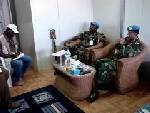



On his feet 24-hours around the clock just for survival, a Nigerian, Christian Ariwodo, father of three children narrates that he is living in Liberia at the mercy of rubber trees for survival for him and his Liberian family.
Speaking to the GNN over the weekend at his “Fire Coal Plantation” on the Kakata/Bong Mines highway, in the midst of hundreds of coal bags early packaged over night with the help of his three children and Liberian wife, said he was in search of what he called for “survival “.
Narrating his story to the GNN Mr. Ariwodo said, “I am a Nigerian who once served in the Peacekeeping Force of the Economic Community if West African States (ECOMOG) during the early days of the Liberian civil war. After completing my peacekeeping mission I went back to Nigeria. Few years later I came back to Liberia because of the love I have for this country. I am married to a Liberian woman with three children. Our survival is on coal making,” Mr. Ariwodo busy bagging his coal said.
He said since 1994, the selling of coal has been the only source of income for him and his family. Adding, “Prior to getting into the selling of coal I sold Kool-Aid in Monrovia for two years. After realizing some little amount of cash for the selling of Kool-Aid, I began to venture in this business”, he told the GNN.
Explaining further to the GNN, the former Nigerian Peacekeeper said he has invested over 17,000.00 Liberian Dollars into burning coal this amount he said, include the purchasing of rubber tress from the residents of this area for coal making purpose, stressing, “At times I end up paying more money to people who claimed to be the rightful owners of trees previously sold to me”, the former ECOMOG Nigerian Captain equipped with smile said.
Mr. Ariwodo surrounded with his three Liberian born children (six years, three years and few months old) were also seen busy helping their father, “My brother this job is very tedious, but for now I have no choice; life must go on”, Mr. Ariwodo glued to his huge pile of coal lamenting stressed.
Dozens of other coal miners (most whom are ex-combatants along with their wives) like Ariwodo, said they were in such business due to hardship being encountered as a result of the lack of job opportunities in the country . “My brother, it is not easy…….the lack of job has made us to sleep in the bushes with our wives and children. Life is not easy on us. Our children are dying from malaria due to mosquito bites in this bush”, one of the local coal miners, James Logan said.
As coal miner launches war on rubber tress for survival, rubber planters are also worrying about the plight and survival of their plantations, one of the major sources for the growth of the Liberian economy.
Speaking on behalf of the Rubber Planters Association of Liberia (RPAL), Charles Morris, one of the Co-Owner of the Morris’ Rubber Farm said he was seriously concerned about the deliberate cutting down of rubber trees by people who claimed to be looking for survival.
“Why should people deliberately do these things without making reference to the RPAL?” he asked in a serious tone. Mr. Morris speaking further called on the Liberian Government to bring to an end such situation.
Speaking to the GNN over the weekend at his “Fire Coal Plantation” on the Kakata/Bong Mines highway, in the midst of hundreds of coal bags early packaged over night with the help of his three children and Liberian wife, said he was in search of what he called for “survival “.
Narrating his story to the GNN Mr. Ariwodo said, “I am a Nigerian who once served in the Peacekeeping Force of the Economic Community if West African States (ECOMOG) during the early days of the Liberian civil war. After completing my peacekeeping mission I went back to Nigeria. Few years later I came back to Liberia because of the love I have for this country. I am married to a Liberian woman with three children. Our survival is on coal making,” Mr. Ariwodo busy bagging his coal said.
He said since 1994, the selling of coal has been the only source of income for him and his family. Adding, “Prior to getting into the selling of coal I sold Kool-Aid in Monrovia for two years. After realizing some little amount of cash for the selling of Kool-Aid, I began to venture in this business”, he told the GNN.
Explaining further to the GNN, the former Nigerian Peacekeeper said he has invested over 17,000.00 Liberian Dollars into burning coal this amount he said, include the purchasing of rubber tress from the residents of this area for coal making purpose, stressing, “At times I end up paying more money to people who claimed to be the rightful owners of trees previously sold to me”, the former ECOMOG Nigerian Captain equipped with smile said.
Mr. Ariwodo surrounded with his three Liberian born children (six years, three years and few months old) were also seen busy helping their father, “My brother this job is very tedious, but for now I have no choice; life must go on”, Mr. Ariwodo glued to his huge pile of coal lamenting stressed.
Dozens of other coal miners (most whom are ex-combatants along with their wives) like Ariwodo, said they were in such business due to hardship being encountered as a result of the lack of job opportunities in the country . “My brother, it is not easy…….the lack of job has made us to sleep in the bushes with our wives and children. Life is not easy on us. Our children are dying from malaria due to mosquito bites in this bush”, one of the local coal miners, James Logan said.
As coal miner launches war on rubber tress for survival, rubber planters are also worrying about the plight and survival of their plantations, one of the major sources for the growth of the Liberian economy.
Speaking on behalf of the Rubber Planters Association of Liberia (RPAL), Charles Morris, one of the Co-Owner of the Morris’ Rubber Farm said he was seriously concerned about the deliberate cutting down of rubber trees by people who claimed to be looking for survival.
“Why should people deliberately do these things without making reference to the RPAL?” he asked in a serious tone. Mr. Morris speaking further called on the Liberian Government to bring to an end such situation.



No comments:
Post a Comment